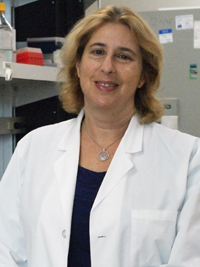 |
Nora Sarvetnick, Ph.D. |
Immediately following surgery, a transplant recipient’s immune system begins a life-long attack on the new organ, which is viewed as a foreign object. Care takers use treatments such as immunosuppressant drugs to hold the immune system at bay.
But the flip side of the coin is that immunosuppressant drugs can disable a patient’s immune system to the point that they struggle to fight off common viruses and bacteria, which become potentially lethal.
“It’s a delicate balance that requires a multidisciplinary approach,” said Nora Sarvetnick, Ph.D., professor in the transplant section of the UNMC Department of Surgery.
Dr. Sarvetnick — an internationally renowned transplant immunologist who came to UNMC recently from the Scripps Research Institute in La Jolla, Calif. — works to find that balance of preserving the new organ while also allowing the patient’s immune system to remain active enough to stave off illness.
“We deal with three central questions in the disciplines of immunology, infectious disease and cell biology,” she said. “These questions involve the identification of key stress factors and cellular survival factors that interact to inhibit cell survival and function in the transplant grafts.”
The immunological question, Dr. Sarvetnick said, is to determine how foreign tissue is rejected and how to prevent rejection, which will improve the longevity of the graft.
From an infectious disease perspective, researchers want to pinpoint what arms of the immune system are required to fight the typical infections that occur in transplant patients and bolster the body to control them, she said.
Applications from the field of cell biology will address the significant issues that arise because of the variable and sometimes suboptimal integrity of the donor tissue, which can cause graft failure, Dr. Sarvetnick said.
“While the talk in transplant is often about finding a ‘match,’ the fact is that everyone is different and match is simply someone whose makeup is very similar,” Dr. Sarvetnick said. “They are not identical and the immune system picks up on these differences.”
While the physiological similarities between a donor organ and a transplant patient can temper immune responses, they don’t eliminate them, she said.
As part of her research, Dr. Sarvetnick examines why rejection occurs and what factors, other than immunosuppressant drugs, can help reduce organ rejection. Among her ideas: engineering organ graft sites and grafts.
She also studies ways to prevent rejection of islet cells, which are insulin-producing cells that are transplanted into patients with diabetes.
|
|
Dr. Sarvetnick plans to start a training program for young scientists in the field of transplant immunology, saying, “this is a growing field and future opportunities for such trainees will be abundant.”
Dr. Sarvetnick spent 18 years at Scripps before coming to UNMC. She brings with her an extensive funding background that includes support from the National Institutes of Health and Juvenile Diabetes Foundation. She has worked and published extensively in the field of autoimmune diabetes.
Dr. Sarvetnick will strengthen the medical center’s transplant immunology capabilities, said Alan Langnas, D.O., professor of surgery, chief of transplant at UNMC’s hospital partner, The Nebraska Medical Center, and director of UNMC’s new Center for Transplantation Medicine.
Dr. Sarvetnick serves as director for basic sciences for the center, which is focused on innovative treatments for patients with organ failure, the molecular genomics for transplant immunology phenomena and population based-outcomes studies.
“We’re very excited to have Nora here with us,” Dr. Langnas said. “She is one of the leading transplant immunologists in the country and brings an extraordinary amount of expertise and intellect to the campus. We look forward to great things from her.”